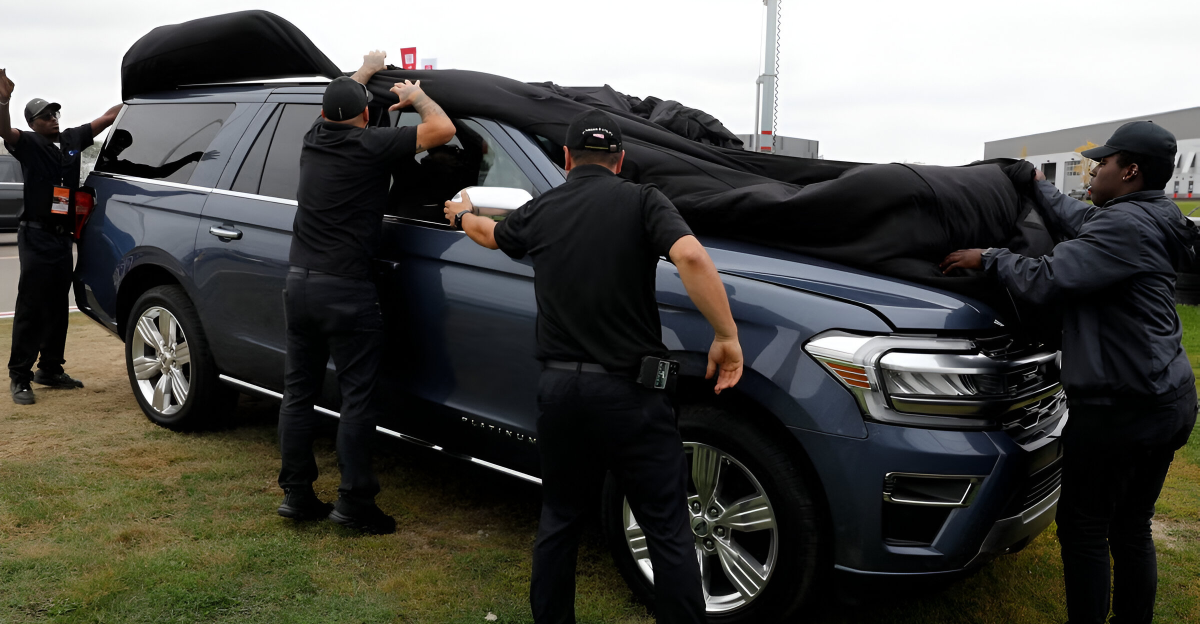
Ford Motor Co. announced a safety recall involving 850,318 U.S. vehicles. It follows regulators’ findings that a defective low-pressure fuel pump “may fail” during use, potentially causing a stall. The NHTSA notice bluntly warns that a roadside stall “increases the risk of a crash”. This recall spans a wide range of Ford and Lincoln models – from 2021–2022 F-150 pickups and Mustangs to 2021–2023 Broncos, Explorers and Super Duty trucks, as well as Lincoln Aviators and Navigators – underscoring the breadth of the problem.
These vehicles include most of Ford’s top-selling lineup, hinting at broad repercussions for drivers and dealers.
Why It’s Happening

NHTSA documents reveal the likely causes. They note failures often trace to “internal contamination of a car’s jet pump,” and that breakdowns happen mainly in hot weather or when the fuel tank is low. Ford says roughly 10% of the 850,318 vehicles it’s recalling actually have this fuel-pump defect, but regulators deemed the risk too serious to ignore.
As NHTSA explains, “a faulty fuel pump can reduce fuel flow from the tank to the engine, causing an engine stall”, which is why the recall was issued.
Warning Signs for Drivers

Already, owners are feeling the recall’s first effects. NHTSA reports six drivers have complained of losing power due to a pump failure. Before a total shut-off, Ford warns drivers may notice misfiring, rough running, reduced power or an illuminated check-engine light. That means drivers should take those symptoms seriously, especially in hot or low-fuel conditions, since a sudden stall on the road can be dangerous.
Safety experts now urge owners to keep tanks topped up and avoid extreme heat, as failures are “more likely” if fuel is low or weather is warm.
Dealers Brace for Repairs

Dealers are quickly feeling the impact. Fox Business reports dealers were informed on Monday, giving them a head start on preparations. Ford says it will mail initial recall notices to owners on July 14, but the actual repair isn’t ready yet.
A second letter will be sent later, advising owners to bring their vehicles in once Ford finalizes a fix. Service departments now brace for a huge surge of appointments – sourcing hundreds of thousands of replacement pumps and parts will be a major challenge.
Industry Fallout

Industry watchers say this recall adds to a troubling trend. Ford has already logged 89 recalls affecting over 5 million vehicles in just six months – more than any automaker in a year. Earlier this spring, it recalled 1 million SUVs and trucks for bad cameras and 274,000 more for brake issues.
Analysts warn that repeatedly flagging flagship models on safety can erode consumer confidence. In practice, that means some buyers may look to competitors, and even insurance companies might recalibrate rates on Ford vehicles with a high recall history.
Financial Strain

For financial markets, the recall raises red flags. As Zacks Investment Research bluntly put it, “recalls aren’t just bad press—they’re expensive,” and every recall eats into Ford’s profit margins. The company already warned of multibillion-dollar losses in its EV unit, and now it faces a mountain of warranty and repair bills on top of that.
Analysts warn this burden could force Ford to raise prices or cut costs elsewhere, a tough balancing act as it pushes toward its next earnings targets.
Owners in Limbo

For drivers caught in limbo, Ford’s recall means waiting. Owners will receive a follow-up letter once a fix is designed, and Ford has promised the service will be free of charge. In other words, the automaker acknowledges the flaw but hasn’t rushed a solution.
With no immediate fix in hand, experts advise caution – keep the tank topped up and heed any warning lights. That said, the average Ford owner now faces a nagging uncertainty every time they turn the key.
Policy Watch

Even policymakers are watching. Ford’s pace of recalls this year is unprecedented, prompting observers to question whether regulators need to tighten oversight. So far, the issue hasn’t reached Congress in a major way, but past cases (like the Takata airbag crisis) show big recalls often draw lawmakers’ attention.
Consumer safety advocates note that a massive campaign like this could figure into future auto safety debates, putting extra pressure on Detroit to improve quality control.
What Owners Should Do

Affected owners should act promptly. First, check your vehicle’s VIN against Ford’s recall list: Ford’s recall code is 25S75 (NHTSA 25V-455). You can call Ford’s recall hotline (1-866-436-7332) or the NHTSA safety hotline to see if your car is covered.
If you have an impacted model, monitor for the warning symptoms described above and consider keeping your fuel tank above half in hot weather – failures are most likely with low fuel and high temperatures. When Ford issues the repair, take your vehicle in promptly; the fix will be performed at no charge.
Long-Term Outlook

What began as a fuel-pump glitch has evolved into a broad test of Ford’s resilience. The company admits the fix is still “under development”, which means drivers are in limbo until the remedy arrives. Industry analysts warn that a string of expensive recalls could weigh on Ford’s sales and reputation – indeed, Ford has already issued more recalls in six months (5 million cars) than any automaker usually does in a full year.
One small part failure has become a test of Ford’s build quality and customer trust, and how well the automaker handles the aftermath will shape buyer confidence moving forward.
